HA3021 Corporations Law: Analysis of Lewski v ASIC & Director Duties
VerifiedAdded on 2023/06/04
|7
|2488
|181
Case Study
AI Summary
This case study provides an in-depth analysis of the Lewski v Australian Securities & Investments Commission (ASIC) case, focusing on the alleged breaches of director's duties under the Corporations Act 2001 (Cth). The case revolves around the actions of the directors of Australian Property Custodian Holdings Limited (APCHL), the Responsible Entity (RE) of a managed investment scheme, specifically concerning amendments to the fund's constitution and the payment of listing fees. The analysis covers the specific duties allegedly breached, including sections 601FD, 208, and 601FC of the Act, and critically examines the court's decision-making process, including the reasons for overturning the trial court's initial judgment. The study also discusses the potential impact of the decision on the development of Australian corporations law, particularly concerning the interpretation of director's duties and related-party transactions. The document concludes by highlighting the significance of considering surrounding circumstances when assessing potential breaches of duty by company directors.
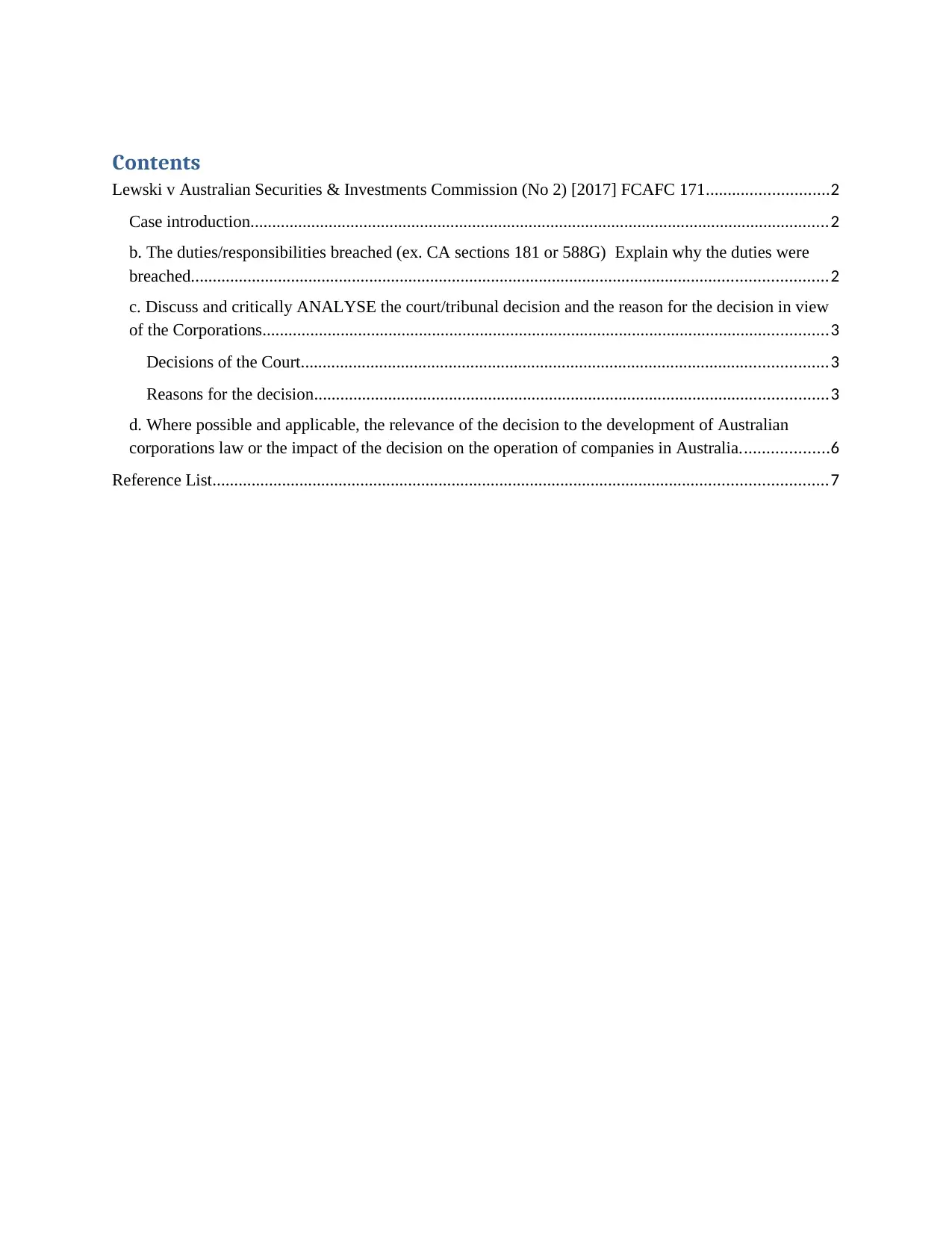
Contents
Lewski v Australian Securities & Investments Commission (No 2) [2017] FCAFC 171............................2
Case introduction.....................................................................................................................................2
b. The duties/responsibilities breached (ex. CA sections 181 or 588G) Explain why the duties were
breached..................................................................................................................................................2
c. Discuss and critically ANALYSE the court/tribunal decision and the reason for the decision in view
of the Corporations..................................................................................................................................3
Decisions of the Court.........................................................................................................................3
Reasons for the decision......................................................................................................................3
d. Where possible and applicable, the relevance of the decision to the development of Australian
corporations law or the impact of the decision on the operation of companies in Australia....................6
Reference List.............................................................................................................................................7
Lewski v Australian Securities & Investments Commission (No 2) [2017] FCAFC 171............................2
Case introduction.....................................................................................................................................2
b. The duties/responsibilities breached (ex. CA sections 181 or 588G) Explain why the duties were
breached..................................................................................................................................................2
c. Discuss and critically ANALYSE the court/tribunal decision and the reason for the decision in view
of the Corporations..................................................................................................................................3
Decisions of the Court.........................................................................................................................3
Reasons for the decision......................................................................................................................3
d. Where possible and applicable, the relevance of the decision to the development of Australian
corporations law or the impact of the decision on the operation of companies in Australia....................6
Reference List.............................................................................................................................................7
Paraphrase This Document
Need a fresh take? Get an instant paraphrase of this document with our AI Paraphraser
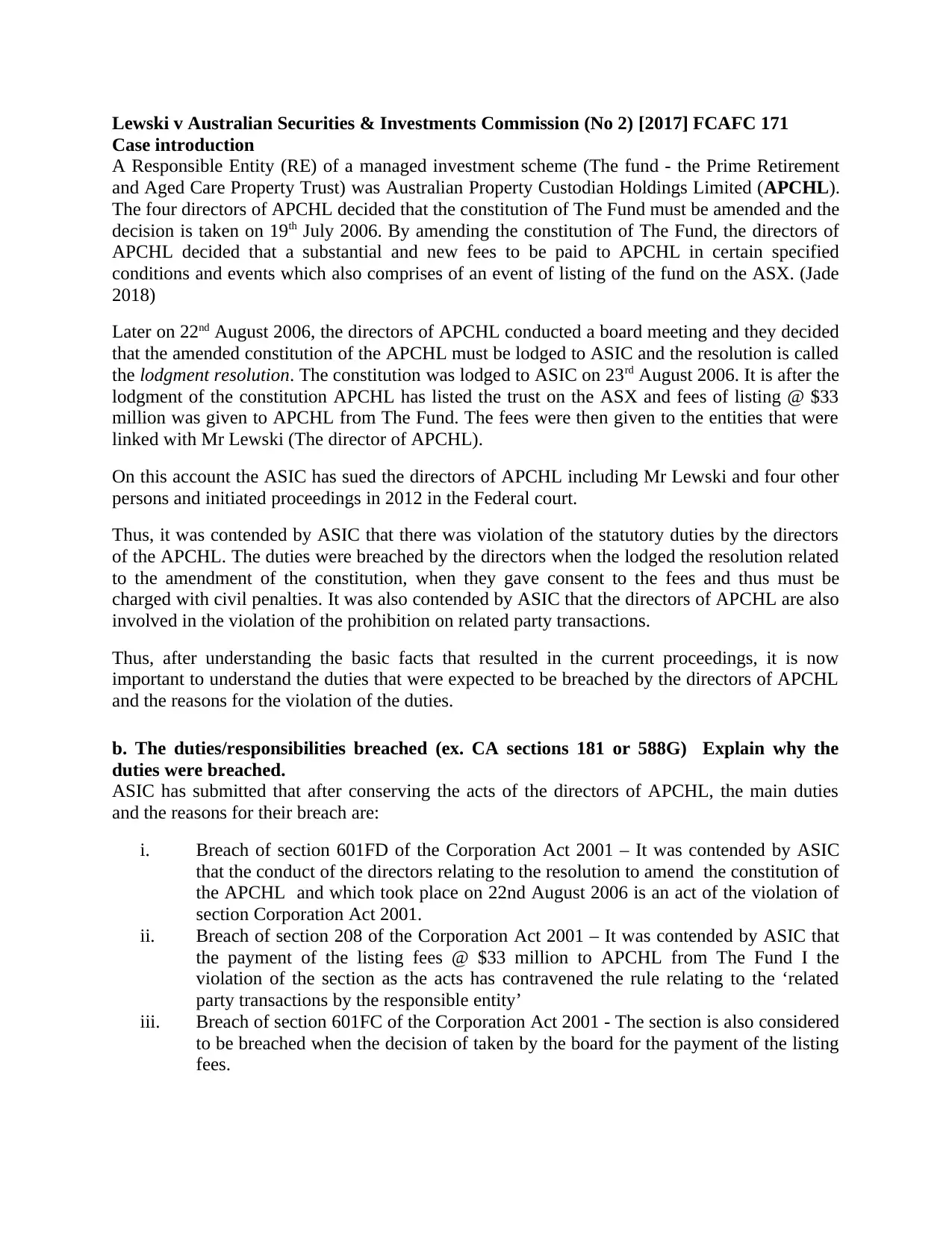
Lewski v Australian Securities & Investments Commission (No 2) [2017] FCAFC 171
Case introduction
A Responsible Entity (RE) of a managed investment scheme (The fund - the Prime Retirement
and Aged Care Property Trust) was Australian Property Custodian Holdings Limited (APCHL).
The four directors of APCHL decided that the constitution of The Fund must be amended and the
decision is taken on 19th July 2006. By amending the constitution of The Fund, the directors of
APCHL decided that a substantial and new fees to be paid to APCHL in certain specified
conditions and events which also comprises of an event of listing of the fund on the ASX. (Jade
2018)
Later on 22nd August 2006, the directors of APCHL conducted a board meeting and they decided
that the amended constitution of the APCHL must be lodged to ASIC and the resolution is called
the lodgment resolution. The constitution was lodged to ASIC on 23rd August 2006. It is after the
lodgment of the constitution APCHL has listed the trust on the ASX and fees of listing @ $33
million was given to APCHL from The Fund. The fees were then given to the entities that were
linked with Mr Lewski (The director of APCHL).
On this account the ASIC has sued the directors of APCHL including Mr Lewski and four other
persons and initiated proceedings in 2012 in the Federal court.
Thus, it was contended by ASIC that there was violation of the statutory duties by the directors
of the APCHL. The duties were breached by the directors when the lodged the resolution related
to the amendment of the constitution, when they gave consent to the fees and thus must be
charged with civil penalties. It was also contended by ASIC that the directors of APCHL are also
involved in the violation of the prohibition on related party transactions.
Thus, after understanding the basic facts that resulted in the current proceedings, it is now
important to understand the duties that were expected to be breached by the directors of APCHL
and the reasons for the violation of the duties.
b. The duties/responsibilities breached (ex. CA sections 181 or 588G) Explain why the
duties were breached.
ASIC has submitted that after conserving the acts of the directors of APCHL, the main duties
and the reasons for their breach are:
i. Breach of section 601FD of the Corporation Act 2001 – It was contended by ASIC
that the conduct of the directors relating to the resolution to amend the constitution of
the APCHL and which took place on 22nd August 2006 is an act of the violation of
section Corporation Act 2001.
ii. Breach of section 208 of the Corporation Act 2001 – It was contended by ASIC that
the payment of the listing fees @ $33 million to APCHL from The Fund I the
violation of the section as the acts has contravened the rule relating to the ‘related
party transactions by the responsible entity’
iii. Breach of section 601FC of the Corporation Act 2001 - The section is also considered
to be breached when the decision of taken by the board for the payment of the listing
fees.
Case introduction
A Responsible Entity (RE) of a managed investment scheme (The fund - the Prime Retirement
and Aged Care Property Trust) was Australian Property Custodian Holdings Limited (APCHL).
The four directors of APCHL decided that the constitution of The Fund must be amended and the
decision is taken on 19th July 2006. By amending the constitution of The Fund, the directors of
APCHL decided that a substantial and new fees to be paid to APCHL in certain specified
conditions and events which also comprises of an event of listing of the fund on the ASX. (Jade
2018)
Later on 22nd August 2006, the directors of APCHL conducted a board meeting and they decided
that the amended constitution of the APCHL must be lodged to ASIC and the resolution is called
the lodgment resolution. The constitution was lodged to ASIC on 23rd August 2006. It is after the
lodgment of the constitution APCHL has listed the trust on the ASX and fees of listing @ $33
million was given to APCHL from The Fund. The fees were then given to the entities that were
linked with Mr Lewski (The director of APCHL).
On this account the ASIC has sued the directors of APCHL including Mr Lewski and four other
persons and initiated proceedings in 2012 in the Federal court.
Thus, it was contended by ASIC that there was violation of the statutory duties by the directors
of the APCHL. The duties were breached by the directors when the lodged the resolution related
to the amendment of the constitution, when they gave consent to the fees and thus must be
charged with civil penalties. It was also contended by ASIC that the directors of APCHL are also
involved in the violation of the prohibition on related party transactions.
Thus, after understanding the basic facts that resulted in the current proceedings, it is now
important to understand the duties that were expected to be breached by the directors of APCHL
and the reasons for the violation of the duties.
b. The duties/responsibilities breached (ex. CA sections 181 or 588G) Explain why the
duties were breached.
ASIC has submitted that after conserving the acts of the directors of APCHL, the main duties
and the reasons for their breach are:
i. Breach of section 601FD of the Corporation Act 2001 – It was contended by ASIC
that the conduct of the directors relating to the resolution to amend the constitution of
the APCHL and which took place on 22nd August 2006 is an act of the violation of
section Corporation Act 2001.
ii. Breach of section 208 of the Corporation Act 2001 – It was contended by ASIC that
the payment of the listing fees @ $33 million to APCHL from The Fund I the
violation of the section as the acts has contravened the rule relating to the ‘related
party transactions by the responsible entity’
iii. Breach of section 601FC of the Corporation Act 2001 - The section is also considered
to be breached when the decision of taken by the board for the payment of the listing
fees.
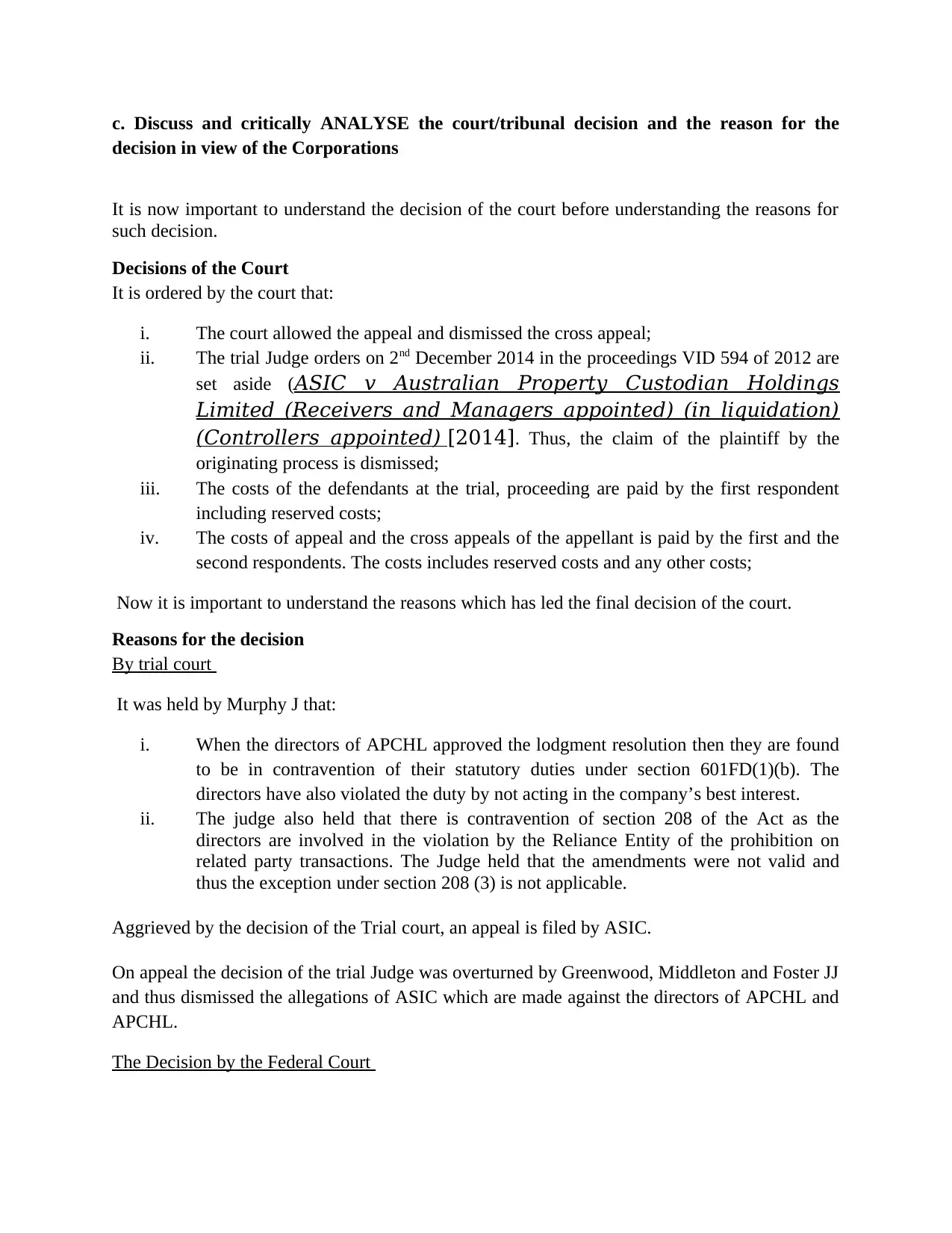
c. Discuss and critically ANALYSE the court/tribunal decision and the reason for the
decision in view of the Corporations
It is now important to understand the decision of the court before understanding the reasons for
such decision.
Decisions of the Court
It is ordered by the court that:
i. The court allowed the appeal and dismissed the cross appeal;
ii. The trial Judge orders on 2nd December 2014 in the proceedings VID 594 of 2012 are
set aside (ASIC v Australian Property Custodian Holdings
Limited (Receivers and Managers appointed) (in liquidation)
(Controllers appointed) [2014]. Thus, the claim of the plaintiff by the
originating process is dismissed;
iii. The costs of the defendants at the trial, proceeding are paid by the first respondent
including reserved costs;
iv. The costs of appeal and the cross appeals of the appellant is paid by the first and the
second respondents. The costs includes reserved costs and any other costs;
Now it is important to understand the reasons which has led the final decision of the court.
Reasons for the decision
By trial court
It was held by Murphy J that:
i. When the directors of APCHL approved the lodgment resolution then they are found
to be in contravention of their statutory duties under section 601FD(1)(b). The
directors have also violated the duty by not acting in the company’s best interest.
ii. The judge also held that there is contravention of section 208 of the Act as the
directors are involved in the violation by the Reliance Entity of the prohibition on
related party transactions. The Judge held that the amendments were not valid and
thus the exception under section 208 (3) is not applicable.
Aggrieved by the decision of the Trial court, an appeal is filed by ASIC.
On appeal the decision of the trial Judge was overturned by Greenwood, Middleton and Foster JJ
and thus dismissed the allegations of ASIC which are made against the directors of APCHL and
APCHL.
The Decision by the Federal Court
decision in view of the Corporations
It is now important to understand the decision of the court before understanding the reasons for
such decision.
Decisions of the Court
It is ordered by the court that:
i. The court allowed the appeal and dismissed the cross appeal;
ii. The trial Judge orders on 2nd December 2014 in the proceedings VID 594 of 2012 are
set aside (ASIC v Australian Property Custodian Holdings
Limited (Receivers and Managers appointed) (in liquidation)
(Controllers appointed) [2014]. Thus, the claim of the plaintiff by the
originating process is dismissed;
iii. The costs of the defendants at the trial, proceeding are paid by the first respondent
including reserved costs;
iv. The costs of appeal and the cross appeals of the appellant is paid by the first and the
second respondents. The costs includes reserved costs and any other costs;
Now it is important to understand the reasons which has led the final decision of the court.
Reasons for the decision
By trial court
It was held by Murphy J that:
i. When the directors of APCHL approved the lodgment resolution then they are found
to be in contravention of their statutory duties under section 601FD(1)(b). The
directors have also violated the duty by not acting in the company’s best interest.
ii. The judge also held that there is contravention of section 208 of the Act as the
directors are involved in the violation by the Reliance Entity of the prohibition on
related party transactions. The Judge held that the amendments were not valid and
thus the exception under section 208 (3) is not applicable.
Aggrieved by the decision of the Trial court, an appeal is filed by ASIC.
On appeal the decision of the trial Judge was overturned by Greenwood, Middleton and Foster JJ
and thus dismissed the allegations of ASIC which are made against the directors of APCHL and
APCHL.
The Decision by the Federal Court
⊘ This is a preview!⊘
Do you want full access?
Subscribe today to unlock all pages.

Trusted by 1+ million students worldwide
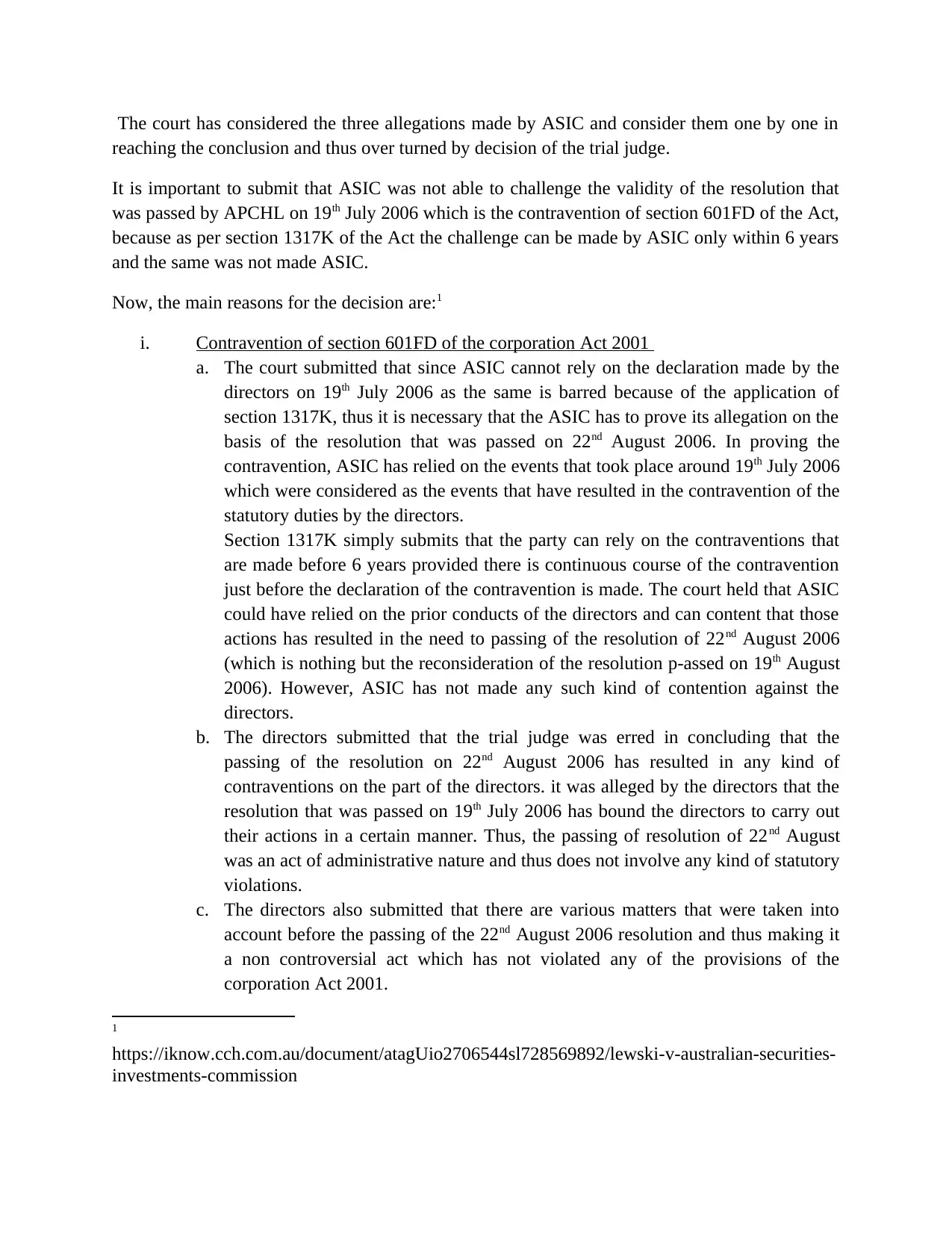
The court has considered the three allegations made by ASIC and consider them one by one in
reaching the conclusion and thus over turned by decision of the trial judge.
It is important to submit that ASIC was not able to challenge the validity of the resolution that
was passed by APCHL on 19th July 2006 which is the contravention of section 601FD of the Act,
because as per section 1317K of the Act the challenge can be made by ASIC only within 6 years
and the same was not made ASIC.
Now, the main reasons for the decision are:1
i. Contravention of section 601FD of the corporation Act 2001
a. The court submitted that since ASIC cannot rely on the declaration made by the
directors on 19th July 2006 as the same is barred because of the application of
section 1317K, thus it is necessary that the ASIC has to prove its allegation on the
basis of the resolution that was passed on 22nd August 2006. In proving the
contravention, ASIC has relied on the events that took place around 19th July 2006
which were considered as the events that have resulted in the contravention of the
statutory duties by the directors.
Section 1317K simply submits that the party can rely on the contraventions that
are made before 6 years provided there is continuous course of the contravention
just before the declaration of the contravention is made. The court held that ASIC
could have relied on the prior conducts of the directors and can content that those
actions has resulted in the need to passing of the resolution of 22nd August 2006
(which is nothing but the reconsideration of the resolution p-assed on 19th August
2006). However, ASIC has not made any such kind of contention against the
directors.
b. The directors submitted that the trial judge was erred in concluding that the
passing of the resolution on 22nd August 2006 has resulted in any kind of
contraventions on the part of the directors. it was alleged by the directors that the
resolution that was passed on 19th July 2006 has bound the directors to carry out
their actions in a certain manner. Thus, the passing of resolution of 22nd August
was an act of administrative nature and thus does not involve any kind of statutory
violations.
c. The directors also submitted that there are various matters that were taken into
account before the passing of the 22nd August 2006 resolution and thus making it
a non controversial act which has not violated any of the provisions of the
corporation Act 2001.
1
https://iknow.cch.com.au/document/atagUio2706544sl728569892/lewski-v-australian-securities-
investments-commission
reaching the conclusion and thus over turned by decision of the trial judge.
It is important to submit that ASIC was not able to challenge the validity of the resolution that
was passed by APCHL on 19th July 2006 which is the contravention of section 601FD of the Act,
because as per section 1317K of the Act the challenge can be made by ASIC only within 6 years
and the same was not made ASIC.
Now, the main reasons for the decision are:1
i. Contravention of section 601FD of the corporation Act 2001
a. The court submitted that since ASIC cannot rely on the declaration made by the
directors on 19th July 2006 as the same is barred because of the application of
section 1317K, thus it is necessary that the ASIC has to prove its allegation on the
basis of the resolution that was passed on 22nd August 2006. In proving the
contravention, ASIC has relied on the events that took place around 19th July 2006
which were considered as the events that have resulted in the contravention of the
statutory duties by the directors.
Section 1317K simply submits that the party can rely on the contraventions that
are made before 6 years provided there is continuous course of the contravention
just before the declaration of the contravention is made. The court held that ASIC
could have relied on the prior conducts of the directors and can content that those
actions has resulted in the need to passing of the resolution of 22nd August 2006
(which is nothing but the reconsideration of the resolution p-assed on 19th August
2006). However, ASIC has not made any such kind of contention against the
directors.
b. The directors submitted that the trial judge was erred in concluding that the
passing of the resolution on 22nd August 2006 has resulted in any kind of
contraventions on the part of the directors. it was alleged by the directors that the
resolution that was passed on 19th July 2006 has bound the directors to carry out
their actions in a certain manner. Thus, the passing of resolution of 22nd August
was an act of administrative nature and thus does not involve any kind of statutory
violations.
c. The directors also submitted that there are various matters that were taken into
account before the passing of the 22nd August 2006 resolution and thus making it
a non controversial act which has not violated any of the provisions of the
corporation Act 2001.
1
https://iknow.cch.com.au/document/atagUio2706544sl728569892/lewski-v-australian-securities-
investments-commission
Paraphrase This Document
Need a fresh take? Get an instant paraphrase of this document with our AI Paraphraser
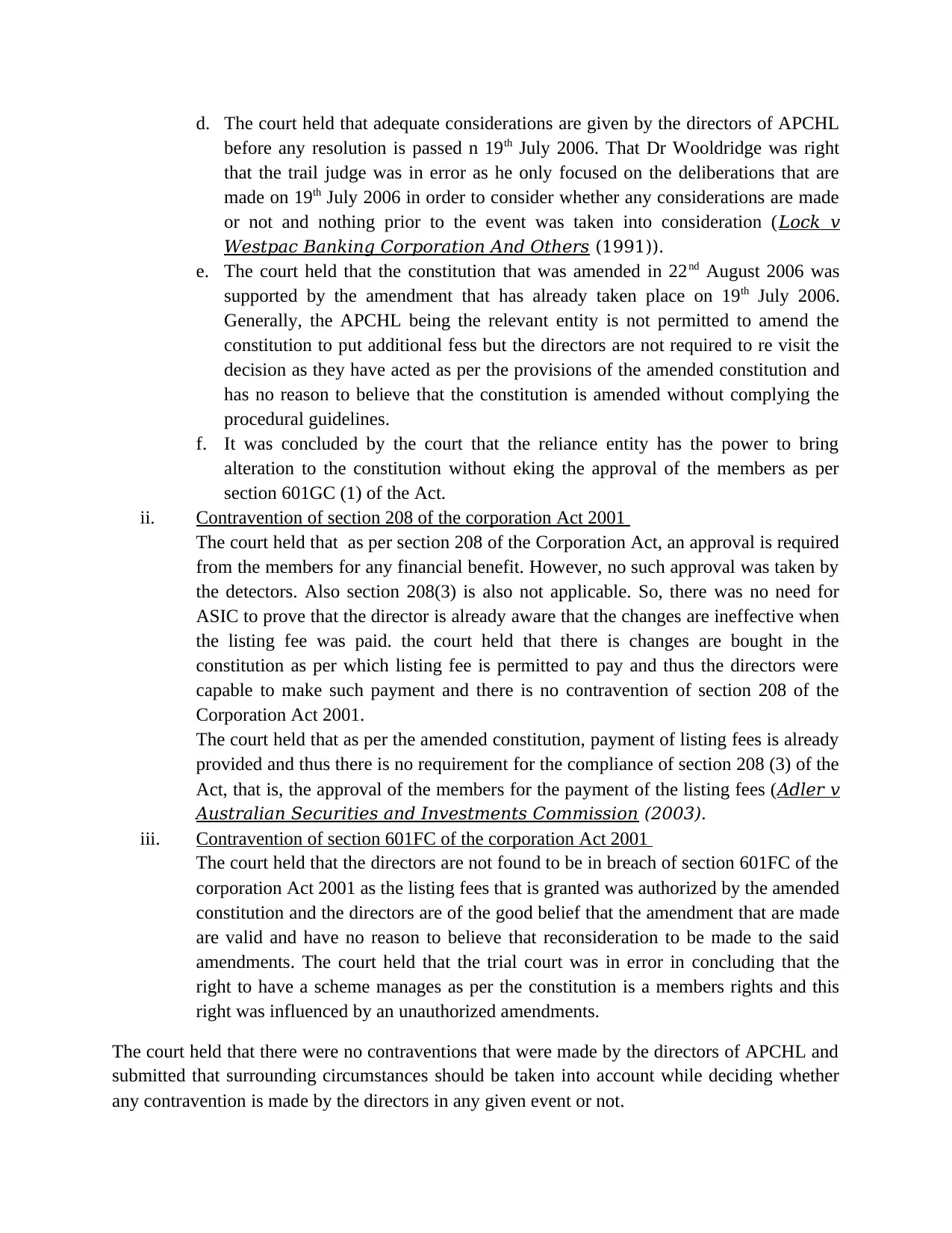
d. The court held that adequate considerations are given by the directors of APCHL
before any resolution is passed n 19th July 2006. That Dr Wooldridge was right
that the trail judge was in error as he only focused on the deliberations that are
made on 19th July 2006 in order to consider whether any considerations are made
or not and nothing prior to the event was taken into consideration (Lock v
Westpac Banking Corporation And Others (1991)).
e. The court held that the constitution that was amended in 22nd August 2006 was
supported by the amendment that has already taken place on 19th July 2006.
Generally, the APCHL being the relevant entity is not permitted to amend the
constitution to put additional fess but the directors are not required to re visit the
decision as they have acted as per the provisions of the amended constitution and
has no reason to believe that the constitution is amended without complying the
procedural guidelines.
f. It was concluded by the court that the reliance entity has the power to bring
alteration to the constitution without eking the approval of the members as per
section 601GC (1) of the Act.
ii. Contravention of section 208 of the corporation Act 2001
The court held that as per section 208 of the Corporation Act, an approval is required
from the members for any financial benefit. However, no such approval was taken by
the detectors. Also section 208(3) is also not applicable. So, there was no need for
ASIC to prove that the director is already aware that the changes are ineffective when
the listing fee was paid. the court held that there is changes are bought in the
constitution as per which listing fee is permitted to pay and thus the directors were
capable to make such payment and there is no contravention of section 208 of the
Corporation Act 2001.
The court held that as per the amended constitution, payment of listing fees is already
provided and thus there is no requirement for the compliance of section 208 (3) of the
Act, that is, the approval of the members for the payment of the listing fees (Adler v
Australian Securities and Investments Commission (2003).
iii. Contravention of section 601FC of the corporation Act 2001
The court held that the directors are not found to be in breach of section 601FC of the
corporation Act 2001 as the listing fees that is granted was authorized by the amended
constitution and the directors are of the good belief that the amendment that are made
are valid and have no reason to believe that reconsideration to be made to the said
amendments. The court held that the trial court was in error in concluding that the
right to have a scheme manages as per the constitution is a members rights and this
right was influenced by an unauthorized amendments.
The court held that there were no contraventions that were made by the directors of APCHL and
submitted that surrounding circumstances should be taken into account while deciding whether
any contravention is made by the directors in any given event or not.
before any resolution is passed n 19th July 2006. That Dr Wooldridge was right
that the trail judge was in error as he only focused on the deliberations that are
made on 19th July 2006 in order to consider whether any considerations are made
or not and nothing prior to the event was taken into consideration (Lock v
Westpac Banking Corporation And Others (1991)).
e. The court held that the constitution that was amended in 22nd August 2006 was
supported by the amendment that has already taken place on 19th July 2006.
Generally, the APCHL being the relevant entity is not permitted to amend the
constitution to put additional fess but the directors are not required to re visit the
decision as they have acted as per the provisions of the amended constitution and
has no reason to believe that the constitution is amended without complying the
procedural guidelines.
f. It was concluded by the court that the reliance entity has the power to bring
alteration to the constitution without eking the approval of the members as per
section 601GC (1) of the Act.
ii. Contravention of section 208 of the corporation Act 2001
The court held that as per section 208 of the Corporation Act, an approval is required
from the members for any financial benefit. However, no such approval was taken by
the detectors. Also section 208(3) is also not applicable. So, there was no need for
ASIC to prove that the director is already aware that the changes are ineffective when
the listing fee was paid. the court held that there is changes are bought in the
constitution as per which listing fee is permitted to pay and thus the directors were
capable to make such payment and there is no contravention of section 208 of the
Corporation Act 2001.
The court held that as per the amended constitution, payment of listing fees is already
provided and thus there is no requirement for the compliance of section 208 (3) of the
Act, that is, the approval of the members for the payment of the listing fees (Adler v
Australian Securities and Investments Commission (2003).
iii. Contravention of section 601FC of the corporation Act 2001
The court held that the directors are not found to be in breach of section 601FC of the
corporation Act 2001 as the listing fees that is granted was authorized by the amended
constitution and the directors are of the good belief that the amendment that are made
are valid and have no reason to believe that reconsideration to be made to the said
amendments. The court held that the trial court was in error in concluding that the
right to have a scheme manages as per the constitution is a members rights and this
right was influenced by an unauthorized amendments.
The court held that there were no contraventions that were made by the directors of APCHL and
submitted that surrounding circumstances should be taken into account while deciding whether
any contravention is made by the directors in any given event or not.
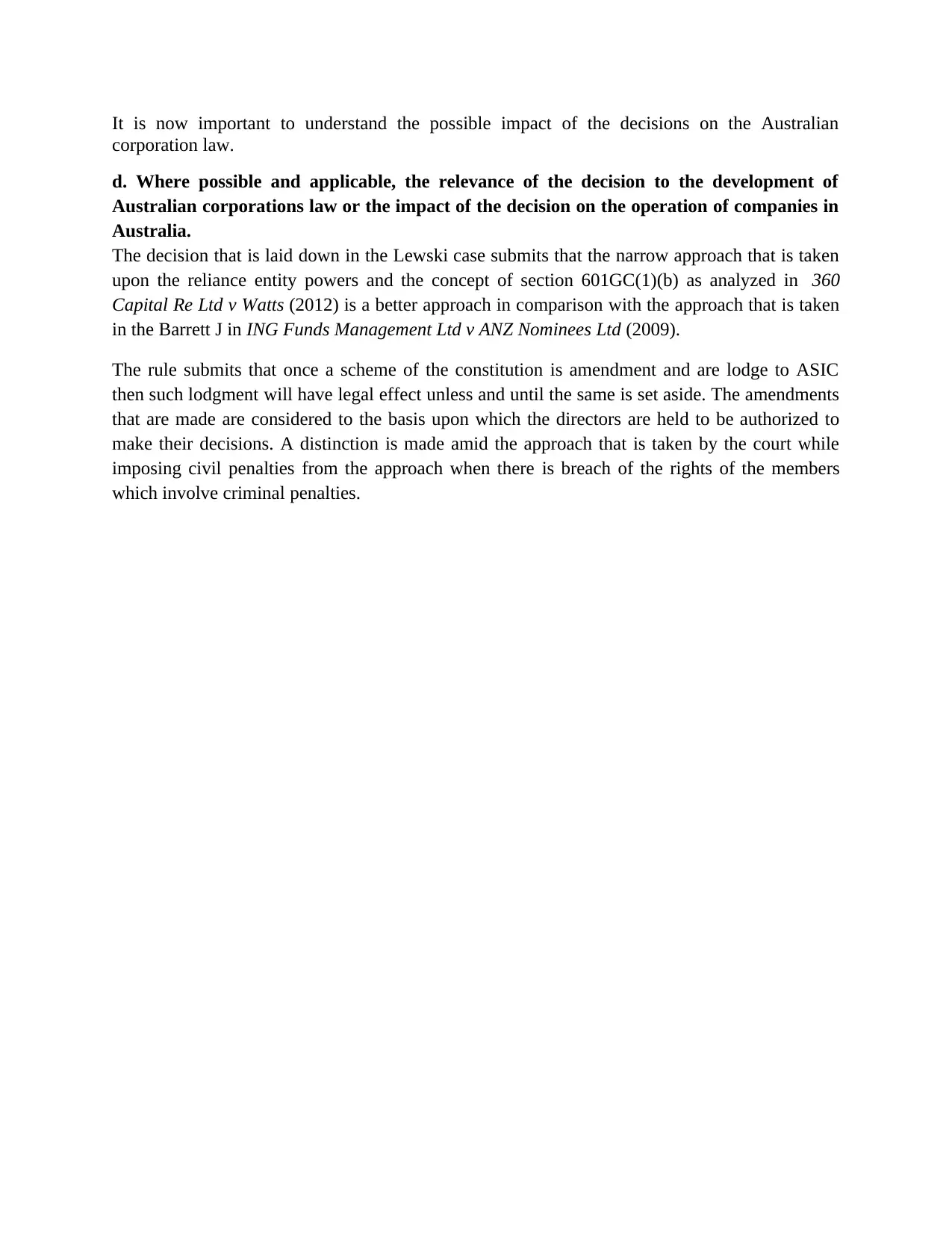
It is now important to understand the possible impact of the decisions on the Australian
corporation law.
d. Where possible and applicable, the relevance of the decision to the development of
Australian corporations law or the impact of the decision on the operation of companies in
Australia.
The decision that is laid down in the Lewski case submits that the narrow approach that is taken
upon the reliance entity powers and the concept of section 601GC(1)(b) as analyzed in 360
Capital Re Ltd v Watts (2012) is a better approach in comparison with the approach that is taken
in the Barrett J in ING Funds Management Ltd v ANZ Nominees Ltd (2009).
The rule submits that once a scheme of the constitution is amendment and are lodge to ASIC
then such lodgment will have legal effect unless and until the same is set aside. The amendments
that are made are considered to the basis upon which the directors are held to be authorized to
make their decisions. A distinction is made amid the approach that is taken by the court while
imposing civil penalties from the approach when there is breach of the rights of the members
which involve criminal penalties.
corporation law.
d. Where possible and applicable, the relevance of the decision to the development of
Australian corporations law or the impact of the decision on the operation of companies in
Australia.
The decision that is laid down in the Lewski case submits that the narrow approach that is taken
upon the reliance entity powers and the concept of section 601GC(1)(b) as analyzed in 360
Capital Re Ltd v Watts (2012) is a better approach in comparison with the approach that is taken
in the Barrett J in ING Funds Management Ltd v ANZ Nominees Ltd (2009).
The rule submits that once a scheme of the constitution is amendment and are lodge to ASIC
then such lodgment will have legal effect unless and until the same is set aside. The amendments
that are made are considered to the basis upon which the directors are held to be authorized to
make their decisions. A distinction is made amid the approach that is taken by the court while
imposing civil penalties from the approach when there is breach of the rights of the members
which involve criminal penalties.
⊘ This is a preview!⊘
Do you want full access?
Subscribe today to unlock all pages.

Trusted by 1+ million students worldwide
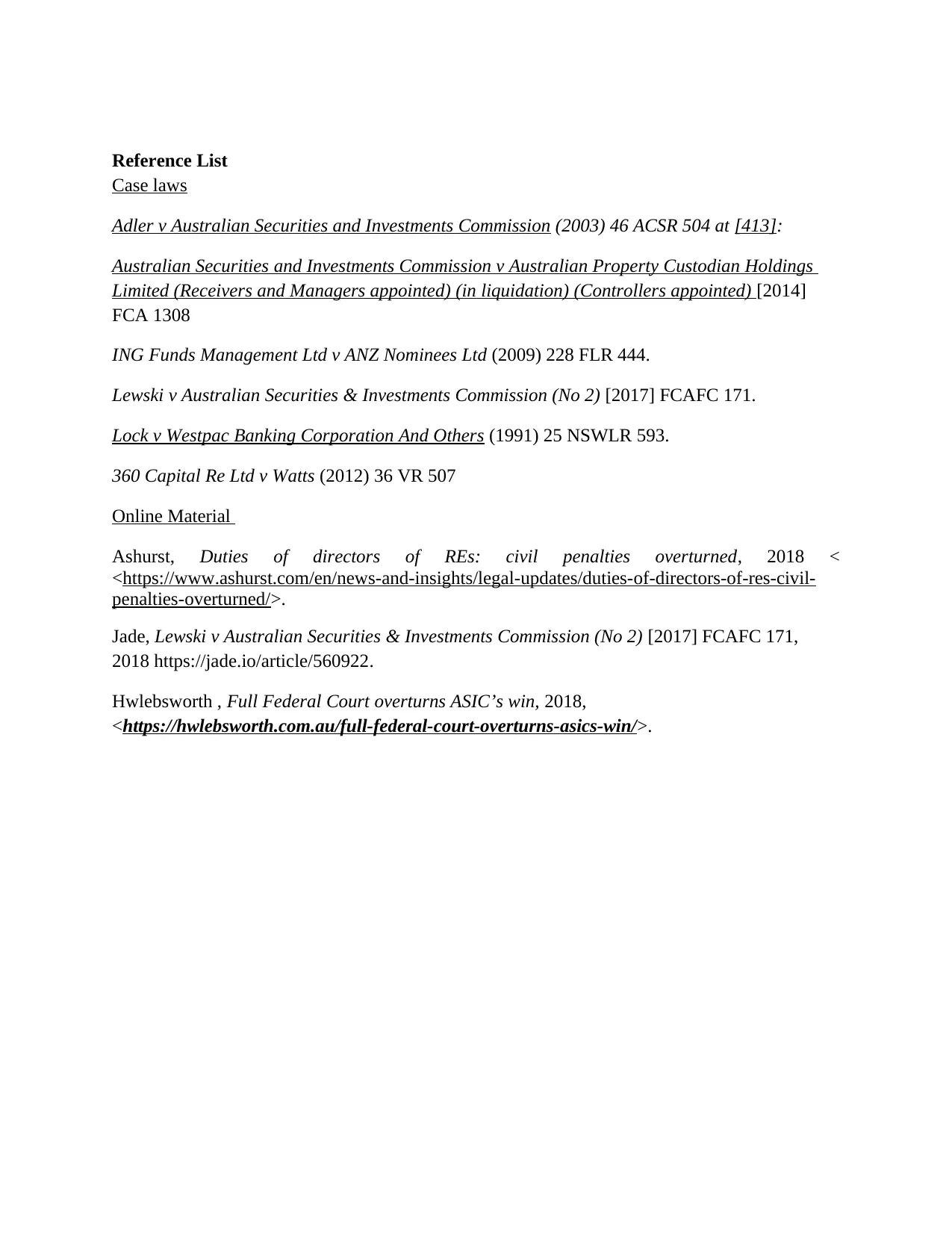
Reference List
Case laws
Adler v Australian Securities and Investments Commission (2003) 46 ACSR 504 at [413]:
Australian Securities and Investments Commission v Australian Property Custodian Holdings
Limited (Receivers and Managers appointed) (in liquidation) (Controllers appointed) [2014]
FCA 1308
ING Funds Management Ltd v ANZ Nominees Ltd (2009) 228 FLR 444.
Lewski v Australian Securities & Investments Commission (No 2) [2017] FCAFC 171.
Lock v Westpac Banking Corporation And Others (1991) 25 NSWLR 593.
360 Capital Re Ltd v Watts (2012) 36 VR 507
Online Material
Ashurst, Duties of directors of REs: civil penalties overturned, 2018 <
<https://www.ashurst.com/en/news-and-insights/legal-updates/duties-of-directors-of-res-civil-
penalties-overturned/>.
Jade, Lewski v Australian Securities & Investments Commission (No 2) [2017] FCAFC 171,
2018 https://jade.io/article/560922.
Hwlebsworth , Full Federal Court overturns ASIC’s win, 2018,
<https://hwlebsworth.com.au/full-federal-court-overturns-asics-win/>.
Case laws
Adler v Australian Securities and Investments Commission (2003) 46 ACSR 504 at [413]:
Australian Securities and Investments Commission v Australian Property Custodian Holdings
Limited (Receivers and Managers appointed) (in liquidation) (Controllers appointed) [2014]
FCA 1308
ING Funds Management Ltd v ANZ Nominees Ltd (2009) 228 FLR 444.
Lewski v Australian Securities & Investments Commission (No 2) [2017] FCAFC 171.
Lock v Westpac Banking Corporation And Others (1991) 25 NSWLR 593.
360 Capital Re Ltd v Watts (2012) 36 VR 507
Online Material
Ashurst, Duties of directors of REs: civil penalties overturned, 2018 <
<https://www.ashurst.com/en/news-and-insights/legal-updates/duties-of-directors-of-res-civil-
penalties-overturned/>.
Jade, Lewski v Australian Securities & Investments Commission (No 2) [2017] FCAFC 171,
2018 https://jade.io/article/560922.
Hwlebsworth , Full Federal Court overturns ASIC’s win, 2018,
<https://hwlebsworth.com.au/full-federal-court-overturns-asics-win/>.
1 out of 7
Related Documents
Your All-in-One AI-Powered Toolkit for Academic Success.
+13062052269
info@desklib.com
Available 24*7 on WhatsApp / Email
![[object Object]](/_next/static/media/star-bottom.7253800d.svg)
Unlock your academic potential
Copyright © 2020–2026 A2Z Services. All Rights Reserved. Developed and managed by ZUCOL.

![Analysis of ASIC v Mariner Corporation Limited [2015] FCA 589 Decision](/_next/image/?url=https%3A%2F%2Fdesklib.com%2Fmedia%2Fimages%2Fqj%2F30a3ee1c1e57462ba500246341ad4101.jpg&w=256&q=75)



